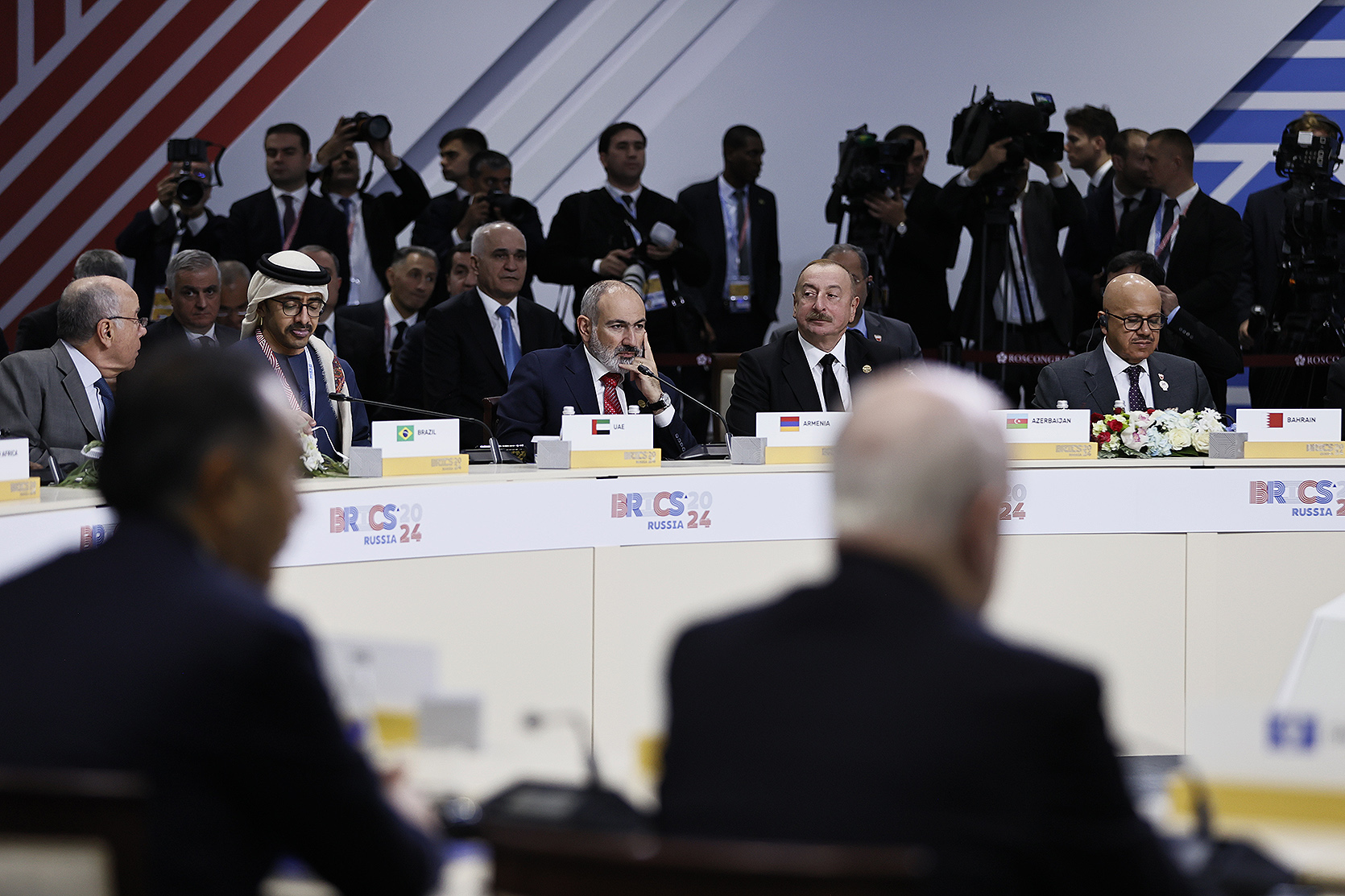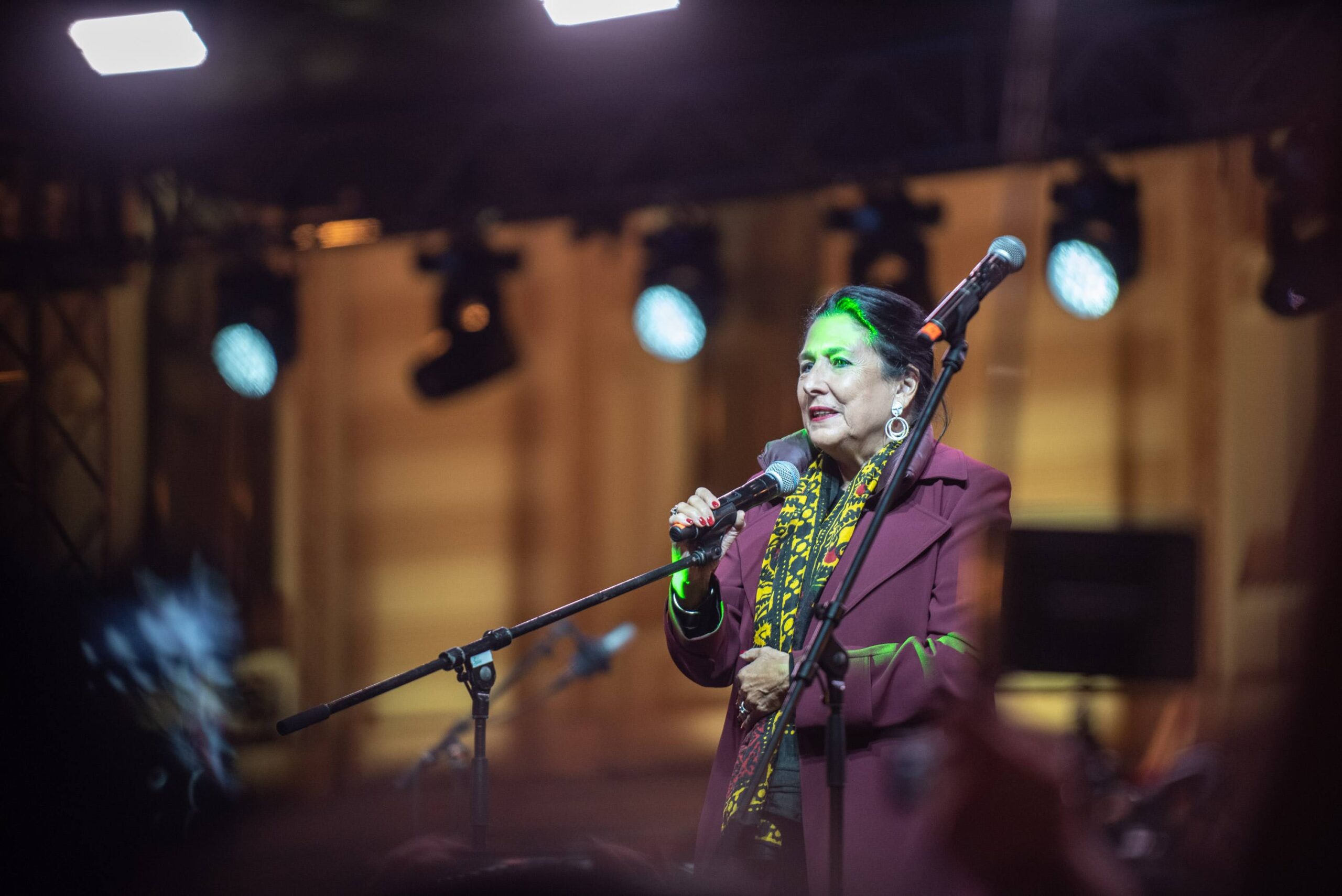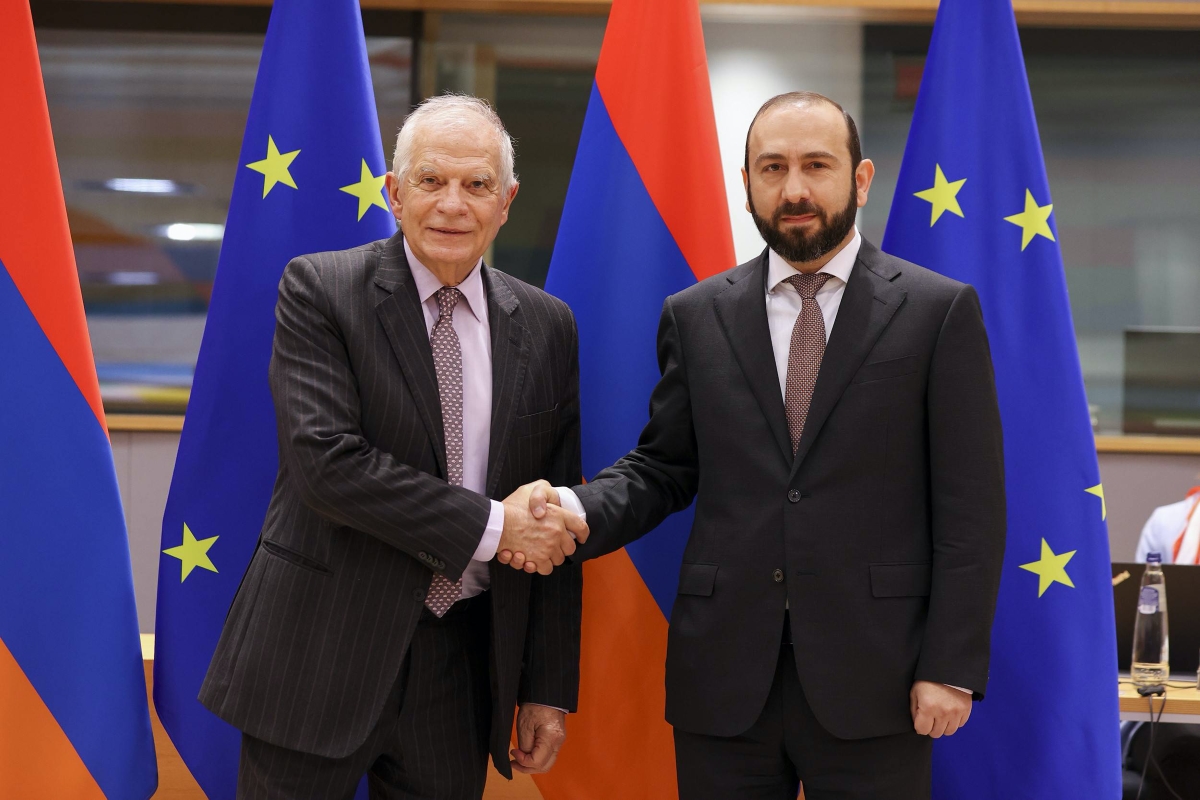
As the Georgia-EU relations continue to freefall after Georgian Dream backtracks on the country’s EU integration following disputed parliamentary elections, where does that leave Armenia as the sole state in the region with serious EU aspirations.
Since the 26 October Georgian parliamentary elections, which were found by both local and international observers to have had serious violations, Georgian Dream has solidified their hold on the government and has continued to turn its back on the West.
The prospect has led to some doubts in how far Armenia may be able to push it’s own EU aspirations.
Tigran Grigoryan, a political analyst and the head of the Regional Centre for Democracy and Security, a Yerevan-based think-tank, foresees a shift in Armenia’s proactive Western approach, but no ‘serious crisis’ in relations with the West.
‘At his latest press conference, Pashinyan hinted that the outcome of the Georgian elections could impact Armenia’s foreign policy decision-making. This means that if [Georgian Dream] remains in power in Georgia, it is likely that Yerevan will tone down its pro-Western rhetoric,’ wrote Grigoryan on X the day of the Georgian elections.
Benyamin Poghosyan, a Senior Research Fellow at the APRI Armenia think-tank, also noted before the elections that if Georgian Dream won, it would mean a continued ‘drift away from the West’ and that if Donald Trump in turn came to power in the US, that American involvement in the South Caucasus ‘might decrease’.
[Read more: How a Trump presidency could impact the South Caucasus]
‘In this scenario, Armenia might have to readjust its foreign policy and relations with regional powers, perhaps considering cooperation with non-Western organizations such as the Shanghai Cooperation Organization and BRICS,’ wrote Poghosyan.
In an interview with CivilNet on 31 October, Grigoryan highlighted that even before the Georgian elections, he observed shifts in the Armenian ruling power’s rhetoric and actions, noticing ‘a certain balancing’.
Among such actions were Armenia’s participation in October in the BRICS summit in Russia on and in the 3+3 Regional Cooperation Platform in Turkey, organisations Poghosyan also noted in his analysis.

With Georgian Dream’s victory, Grigoryan believes that an emphasis will now be placed on regulating the relations with Armenia’s immediate neighbours, Turkey and Azerbaijan, with a much greater motivation to reach a peace agreement with Azerbaijan ‘at all costs’.
‘In this situation, Armenia once again finds itself in isolation. If for the past 20 years, Armenia was the only country seeking closer relations with Russia, now the opposite picture is emerging. Armenia is the only country [in the region] that seems to want to have closer relations with the West,’ Grigoryan told Civilnet.
Similarly, Poghosyan argued in an interview from 29 October that it would be ‘very challenging’ for Armenia to become the only ‘pro-western country’ in the South Caucasus and to ‘bring the West into the South Caucasus’, because this might put Armenia against all regional powers. This in its turn could create ‘very negative implications for Armenia’, which suffered defeat and remains ‘significantly vulnerable for potential new Azerbaijani attacks’, in addition to dealing with an unresolved normalisation process with Turkey.
A bridge connecting the South Caucasus to the EU?
During the pre-election campaign, Georgian opposition leaders were vocal about the possible impact a Georgian Dream victory could have on European integration, seeking to attract Armenian voters.
Two days before the election, the third president of Georgia, Mikheil Saakashvili wrote in Armenian on Facebook, telling the Georgian-Armenian community that ‘the existence of our neighbor Armenia, as well as the fate of peace in the Caucasus, depends on Georgia’s return to the European path.’
Prior to this, at the end of September, Georgian President Salome Zourabichvili stated that Armenia ‘needs a Georgian bridge’ in its European aspirations.
‘After the elections on 26 October, either Georgia will return to its European path, I am sure of this […] or Georgia will no longer exist, and this will be a tragedy not only for us, but also for neighboring Armenia, which is developing in the same direction and which needs a Georgian bridge, and this will be a tragedy for the Caucasus and the representation of Europe in this region,’ Zourabichvili said.

However, Sergey Lagodinsky, a member of the European Parliament representing Germany, told Armenian reporters the day prior to the Georgian elections that Armenia could turn into that bridge, despite finding itself ‘in a tough situation if there is further negative development in Georgia’.
The ‘situation might create unique chances for Armenia, as the country could become some sort of a bridge connecting the EU with the South Caucasus [politically], as well as with the whole region to the east’, Lagodinsy said.
Unlike Lagodinsky, Stefan Meister, the Head of the Centre for Order and Governance in Eastern Europe, Russia, and Central Asia at the German Council on Foreign Relations, told OC Media that because of its geographic location as a landlocked country, Armenia cannot replace Georgia.
Moreover, Meister did not see ‘such a pro European or transatlantic oriented society’ in Armenia, as compared to Georgia.
‘For Armenia in its current geopolitical and security situation, it is as much important to have good relations with its other neighbors, especially, Iran but also Turkey. That will limit its role as a bridge to Europe,’ Meister told OC Media, adding that he could imagine Armenia becoming ‘a hub for civil society in the region if the government can guarantee safety of people’.
Is EU integration still possible?
Peter Stano, a spokesperson for the European Commission’s Foreign Affairs and Security Policy, told OC Media that each country in the region ‘has its role to play’.
‘The bilateral partnerships the EU develops are about the partners concerned and not an instrument to use to “replace” or “complement” partnerships or relations with others,’ Stano said.
‘Georgia progressing or not progressing on its EU path has nothing to do with and no influence on the bilateral relationship of the EU with Armenia. What we do with Armenia responds only and exclusively to the level of ambition of Armenia,’ Stano added.
Stano also highlighted Yerevan’s statement from October 2023, expressing readiness to move closer to the EU, which was responded to with the launch of work on a new EU-Armenia Partnership Agenda, which ‘is dedicated to continue developing cooperation between the EU and Armenia and both sides are determined to make progress on this’.

‘We are proceeding well. Just two months ago, we launched Visa Liberalisation Dialogue, which is a clear sign that we are moving forward with the Partnership Agenda. Our relations are developing on a positive track, they are stronger than ever and there continues to be a mutual interest to advance them further’, Stano told OC Media.
The Armenian Foreign Ministry refrained from commenting on the possible impact of the Georgian elections on Armenia’s foreign policy.
While the authorities have been rather noncommittal in their statements, Olesya Vartanyan, a regional expert on security issues and conflicts in the South Caucasus, pointed at the timing of the launch of visa liberalisation talks with Armenia as a form of ‘confirmation’ to the Armenian government that there is still room for cooperation.
Despite the fact that Armenia has sought such dialogue for a while, Vartanyan believed it was launched in September before the Georgian elections ‘on purpose’, taking into the consideration that Georgia ‘would be going through some turbulence’.
‘If we were to have a situation when Brussels first cancels visa liberalisation for Georgia and there is a conversation on launching it in Armenia, it would have raised many more questions and would have created many more problems,’ Vartanyan told OC Media.
Vartanyan also emphasised that the EU often thinks geographically when considering cooperation and integration, ‘but that does not necessarily mean that the Georgian election automatically closes the door for Armenia’.
However, she noted that if some in Armenia’s leadership are seeking an excuse to cancel some of the processes or to stop thinking about how to deepen the relationship, they can find a pretext, such as the Georgian elections.
Similarly, Ondrej Ditrych, a Senior Analyst at the EU Institute for Security Studies, told OC Media that Armenia could have an advantage as the only state in the South Caucasus with real European aspirations.
‘It is true that this also means certain limitations in terms of the ultimate goal of EU membership — at least as long as Georgia’s integration is effectively stalled. But much can be achieved in the meantime — in terms of limiting dependencies and vulnerabilities related to them, institutional capacity building or easing mobility. I don’t think there are reasons for desperation. It is important to take a long, strategic view.’
For Meister, however, it was important that expectations were kept realistic. EU Membership in the near future or any close integration with the EU for Armenia is ‘neither in Armenia’s interest, nor has the EU capacities for this.’
‘But to develop close ties in areas like human exchange, security, energy, and economic cooperation is possible, and opening the visa negotiations is one important step. Definitely the situation in Georgia will impact these developments, but from the EU side it means more resources and attention for Armenia, and if Yerevan is able to use this in its reform process without alienating its direct neighbors it can really come closer to the EU without direct integration and too much alienation of Russia,’ Meister told OC Media.
A question of economics?
While much of the discussion has related to Armenian–EU relations, that is not the only area in Armenia experts expect to see affected following the Georgian elections.
According to Vartanyan, Armenia’s Western integration is ‘the most theoretical’ issue in terms of the risks for Armenia. Instead, she highlighted more short-term and longer potential impacts that Armenia should pay attention to in regards to what is happening in Georgia.
One of these short-term risks could be ‘some violence or turbulence’ in Tbilisi, which could destabilise the situation in the country, creating ‘some problems for the Armenian cargo that uses Georgia as a transit country to travel to the West, but to Russia first of all’.
Another short term risk Vartanyan highlighted is potential sanctions.
‘When the US sanctioned just two Georgian officials in September, it right away had an effect on Georgian currency, it started devaluating’ Vartanyan said.
[Read more: US sanctions four Georgian security officials and far-right extremists for ‘serious human rights abuses’
‘If we are to see more sanctions and more restrictions, in that sense there will be immediate effect in terms of the problem of the Georgian economy and Georgian businesses, especially in the last couple of years they started investing in Armenia and recently we had a Georgian bank that purchased a big share of one of the biggest Armenian banks’.
[Read more: Bank of Georgia to acquire Armenia’s Ameriabank for $304 million]
As for the long-term risks, Vartanyan pointed to the potential increase of Russian investment and the decline of the Western investors, who think more about the region rather than solely Armenia.
Vartanyan told OC Media that if Georgia deepens its crisis with Western countries — and gets closer with Russia, including the resumption of diplomatic ties — there would be increased Russian presence in ‘some key projects’, including transit roads that interest both foreign investors and Russia.
This would mean greater Russian influence in the region, a factor Armenia must consider when discussing its cooperation with the West, as well as for its domestic development.
‘To be honest, the economy, the sanctions issue, and also the Russian presence in my view are much more important than the whole conversation about whether Armenia goes to the West or not because of the Georgia elections. You can still work on Western integration even with Georgia going through some turbulence, but if we are to see more sanctions and Russian presence in Georgia, that’s much more serious for Armenia’.









